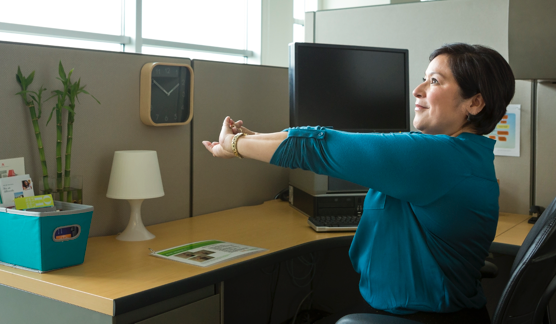Flexible health care for all of life’s moments

What is integrated care?
It’s care and coverage — so it’s different than your other options. Caregivers, hospitals, and health plans all work together to provide you with high-quality care and better outcomes. At Kaiser Permanente, our incentive is to keep our members healthy, not earn more money when they’re sick. We focus on preventive care, chronic disease management programs, and systems that support convenient, efficient care.
Your life is constantly changing, from minor shifts to major upheavals. Your favorite breakfast spot closes. You land your dream job. You run a 10K … and pull a hamstring. Your child says his first word.
Whether you’ve lived in the same town since birth or you’ve been all over the world, your life has probably changed in ways big and small. You want health care that can support you no matter where life takes you.
Integrated care meets you right where you are because it puts you at the center of everything. Doctors, hospitals, and health plans are all connected to each other with the shared mission of helping you stay at your best.
Learn what to look for when choosing a health plan — and see how integrated care supports you at every age and stage of life.
| What your life may be like today | What to look for in a health plan |
|---|---|
YOUR 20SWhether you’re moving to a new city, starting your first real job after school, or working multiple gigs to make ends meet, it feels like everything is happening for the first time. Health care probably isn’t top of mind, but it’s still important. |
YOUR 20SFind a plan that focuses on prevention and makes it easy to stay on top of your health. Convenient tools will let you connect to care when you can’t get to the doctor. Instead, you can get 24/7 advice by phone, email your doctor’s office with nonurgent questions, and schedule care for minor conditions by phone or video. |
YOUR 30SYou’re getting better at meeting life’s challenges — at work and in your personal life. You may be juggling your job, a growing family, evolving relationships — and time seems to be moving faster. Slow down and reflect on what’s important to you. |
YOUR 30SSave precious time with a provider that offers care in multiple places. You can visit a location near your home, workplace, or kids’ school — and access lab, pharmacy, and X-ray services all under one roof. Partners and parents. Bosses and babies. Relationships make our lives worth living, but they sometimes bring stress. You deserve care that supports your mental health as well, with services you can access without a referral. |
YOUR 40S AND 50SAt this point, life can start to feel serious. Lifestyle choices like poor diet and lack of exercise may be catching up with you.* Aging parents or kids at home might rely on you for help with their care. And it’s hard to balance all that with your job. |
YOUR 40S AND 50SYou want a health plan that excels at diagnosing chronic conditions early, has programs to help you manage your condition, and applies the latest evidence-based treatments. If you have a family, find a plan that lets you easily manage their care, such as scheduling appointments and viewing lab results online. Also, other digital tools can connect you to your care team from anywhere. You can get a checkup over video, review your doctor’s notes on your smartphone, and order prescriptions online for delivery to your home. |
YOUR 60S AND 70SThese days, many people are choosing to stay in the workforce. Whether you love your job, want to try out a brand-new skill, or just need the money, staying physically and socially active can be beneficial. And if you can’t wait to retire, make sure nothing gets in the way of your dreams. |
YOUR 60S AND 70SYou deserve access to world-class specialists who’ll get you the right care quickly. And with your care and coverage combined, you won’t have to search for a specialist or file a claim. In a connected system, they’ll coordinate with your personal doctor, so you don’t have to share test results and prescription lists yourself. And when you’re ready to retire, you can switch to a Medicare plan and still keep your personal doctor. |
YOUR 20S
-
What your life may be like today
Whether you’re moving to a new city, starting your first real job after school, or working multiple gigs to make ends meet, it feels like everything is happening for the first time. Health care probably isn’t top of mind, but it’s still important.
-
What to look for in a health plan
Find a plan that focuses on prevention and makes it easy to stay on top of your health.
Convenient tools will let you connect to care when you can’t get to the doctor. Instead, you can get 24/7 advice by phone, email your doctor’s office with nonurgent questions, and schedule care for minor conditions by phone or video.
YOUR 30S
-
What your life may be like today
You’re getting better at meeting life’s challenges — at work and in your personal life. You may be juggling your job, a growing family, evolving relationships — and time seems to be moving faster. Slow down and reflect on what’s important to you.
-
What to look for in a health plan
Save precious time with a provider that offers care in multiple places. You can visit a location near your home, workplace, or kids’ school — and access lab, pharmacy, and X-ray services all under one roof.
Partners and parents. Bosses and babies. Relationships make our lives worth living, but they sometimes bring stress. You deserve care that supports your mental health as well, with services you can access without a referral.
YOUR 40S AND 50S
-
What your life may be like today
At this point, life can start to feel serious. Lifestyle choices like poor diet and lack of exercise may be catching up with you.* Aging parents or kids at home might rely on you for help with their care.
And it’s hard to balance all that with your job.
-
What to look for in a health plan
You want a health plan that excels at diagnosing chronic conditions early, has programs to help you manage your condition, and applies the latest evidence-based treatments.
If you have a family, find a plan that lets you easily manage their care, such as scheduling appointments and viewing lab results online. Also, other digital tools can connect you to your care team from anywhere. You can get a checkup over video, review your doctor’s notes on your smartphone, and order prescriptions online for delivery to your home.
YOUR 60S AND 70S
-
What your life may be like today
These days, many people are choosing to stay in the workforce. Whether you love your job, want to try out a brand-new skill, or just need the money, staying physically and socially active can be beneficial. And if you can’t wait to retire, make sure nothing gets in the way of your dreams.
-
What to look for in a health plan
You deserve access to world-class specialists who’ll get you the right care quickly. And with your care and coverage combined, you won’t have to search for a specialist or file a claim. In a connected system, they’ll coordinate with your personal doctor, so you don’t have to share test results and prescription lists yourself. And when you’re ready to retire, you can switch to a Medicare plan and still keep your personal doctor.
Get the right care at any age with
Kaiser Permanente
Providing you with high-quality care is our mission. No matter what stage of life you’re in, your care team will be there to help you thrive.
Choose a partner that puts you first
Get a health plan that works for you - and care that fits your life.Are you losing your coverage? We’ll help you keep the same great care. Learn more
You Might Also Like
HMO vs. PPO plans - what are the differences?
HSA vs. FSA – what are the differences?
10 health insurance questions to ask before accepting a job
Why workers should care about employee wellness programs
How to stay active at work, even with a desk job
Want to get a better workout? Try these 8 fitness tricks.
Health apps and online tools get superpowered in a connected system
You Might Also Like
*Christine Buttorff et al., Multiple Chronic Conditions in the United States, RAND Corporation, 2017, p. 7. [fightchronicdisease.org/sites/default/files/TL221_final.pdf]





















